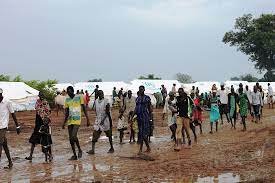UNHCR concerned about safety of refugees caught up in Sudan conflict

UNHCR, the UN Refugee Agency, is increasingly concerned about the safety and wellbeing of refugees who have been caught up in the conflict in Sudan, alongside other civilians, as humanitarian access remains limited, and reports of human rights abuses rise.
We are particularly worried about the plight of refugees in Khartoum. While the number of refugees in the capital has significantly decreased to less than half of the pre-conflict total and now stands at below 150,000, those still present face a dire situation, ranging from security issues to accessing food and basic services.
“The security situation is significantly hampering our ability to undertake humanitarian activities in Khartoum beyond minimal protection monitoring by phone through community outreach volunteers, a new Telegram channel and a 24-hour refugee hotline when there is connectivity,” said Fatima Mohammed Cole, UNHCR’s Deputy Representative in Sudan. “All our previous attempts to reach the capital and help refugees there have failed so far and our two offices in Khartoum have been looted.”
An estimated 150,000 refugees have now independently left Khartoum to relocate in dangerous conditions to White Nile, Gedaref, Kassala, and Jazira States and Port Sudan, according to the Sudanese Commission for Refugees (COR).
We are deeply disturbed by reports of human rights abuses against refugees, including reports of theft, threats, and physical and sexual violence. While we have not been able to corroborate these reports due to the continued security situation and the lack of access, we reiterate our call to ensure the protection of all civilians, including refugees and asylum-seekers. Of special concern is the situation of the most vulnerable, such as women, children, older people, refugees with medical conditions, and people with disabilities.
Through its hotlines, UNHCR continues to provide refugees with advice and, where possible, referrals. Information on available services has been disseminated on the internet and social media channels. UNHCR has also been working closely with community protection networks and refugee leaders to help deliver protection and assistance in safe areas across the country.
UNHCR continues to have a presence and is working with partners to provide critical assistance where it is still safe to do so, mainly in Kassala, Gedaref, White Nile and Blue Nile States. Most refugees have moved towards locations where they have existing ties.
In Port Sudan, where thousands of people, including Sudanese and refugees of various nationalities, have fled, UNHCR has been working with partners to identify gathering sites and assess the needs of the newly arrived. Documentation is being issued to asylum-seekers and refugees and core relief items such as blankets and plastic sheeting are being distributed to the most vulnerable.
In White Nile and Blue Nile, we continue to provide humanitarian assistance to the thousands of South Sudanese, such as shelter, clean water, hygiene kits and health services, including to new arrivals from Khartoum, but stocks are dwindling. Food was also distributed recently by the World Food Programme.
We are relocating thousands of refugees who were previously in the capital city and managed to move to Madani, a city southeast of Khartoum in Jazira State, to Gedaref. Essential services continue to be provided to the thousands of Ethiopian refugees in camps. UNHCR is coordinating the reception of those newly arrived with Sudanese authorities, providing them with essential support, including hot meals, shelter and core relief items such as blankets, jerrycans and mattresses.
Eritrean refugees and asylum-seekers represent the majority of those arriving in Kassala, where they are registered and relocated to existing camps and can access lifesaving aid.
We are monitoring Sudan’s key border crossings and we continue to work with neighbouring governments to ensure access is given to civilians fleeing Sudan.
Considering the increasing vulnerability of refugees across the country, we are scaling up information campaigns to alert them about the dangers of human trafficking and smuggling. We continue to advocate with Sudanese authorities to strengthen relevant security measures in refugee camps.
We are deeply worried about the worsening situation in Darfur, where all civilians, including refugees and internally displaced people, are living in dire conditions. UNHCR is providing support where we can, including through the provision of hygiene kits to health centres and remote protection monitoring, but our ability to assist has been seriously hampered.
UNHCR, with partners, is doing its utmost to protect and assist refugees in Sudan under very challenging circumstances. We continue to call for the ceasefire to be respected so that people caught in the conflict can move to safer locations and humanitarian assistance can reach those in need.
- READ MORE ON:
- UNHCR
- Sudan
- Fatima Mohammed Cole










